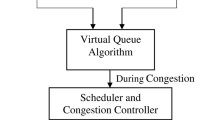Abstract
In a distributed mobile computing system, an efficient packet scheduling policy is a crucial component to achieve a high utilization of the precious bandwidth resources while satisfying users' QoS (quality of service) demands. An important class of scheduling techniques, namely, the wireless fair queueing algorithms, have been extensively studied recently. However, a major drawback in existing approaches is that the channel model is overly simplified – a two-state channel (good or bad) is assumed. While it is relatively easy to analyze the system using such a simple model, the algorithms so designed are of a limited applicability in a practical environment, in which the level of burst errors is time-varying and can be exploited by using channel adaptive coding and modulation techniques. In this paper, we first argue that the existing algorithms cannot cater for a more realistic channel model and the traditional notion of fairness is not suitable. We then propose a new notion of fairness, which bounds the actual throughput normalized by channel capacity of any two data connections. Using the new fairness definition, we propose a new fair queueing algorithm called CAFQ (Channel Adaptive Fair Queueing), which, as indicated in our numerical studies, outperforms other algorithms in terms of overall system throughput and fairness among error prone connections.
Similar content being viewed by others
References
I.F. Akyildiz, D.A. Levine and I. Joe, A slotted cdma protocol with BER scheduling for wireless multimedia networks, IEEE/ACM Trans. Networking 7(2) (1999) 146–158.
P. Bender, P. Black, M. Grob, R. Padovani, N. Sindhushayana and A. Viterbi, CDMA/HDR: A bandwidth efficient high-speed wireless data service for nomadic users, IEEE Communications Magazine 38(7) (2000) 70–77.
P. Bhagwat, P. Bhattacharya, A. Krishna and S.K. Tripathi, Using channel state dependent packet scheduling to improve TCP throughput over wireless LANs, ACM/Baltzer Wireless Networks 3(1) (1997) 91–102.
V. Bharghavan, S. Lu and T. Nandagopal, Fair queuing in wireless networks: Issues and approaches, IEEE Personal Communications 6(1) (1999) 44–53.
Y. Cao and V.O.K. Li, Scheduling algorithms in broadband wireless networks, Proceedings of the IEEE 89(1) (2001) 76–87.
D.A. Eckhardt and P. Steenkiste, Effort-Limited Fair (ELF) scheduling for wireless networks, in: Proc. INFOCOM'2000, Vol. 3 (2000) pp. 1097–1106.
A.J. Goldsmith and S.-G. Chua, Variable-rate variable-power MQAM for fading channels, IEEE Trans. Communications 45(10) (1997) 1218–1230.
P. Goyal, H.M. Vin and H. Chen, Start-time fair queueing: A scheduling algorithm for integrated services, in: Proc. ACM SIGCOMM'96 (1996) pp. 157–168.
A. Jalali, R. Padovani and R. Pankaj, Data throughput of CDMA-HDR: A high efficiency high data rate personal communication wireless system, in: Proc. VTC'2000, Vol. 3 (2000) pp. 1854–1858.
M.R. Jeong, H. Morikawa and T. Aoyama, Fair scheduling algorithm for wireless packet networks, in: Proc. ICPP'99 (1999) pp. 280–285.
M. Kang and S. Wilbur, A fair guaranteed down-link sharing scheme for cellular packet switched networks, in: Proc. GLOBECOM'97, Vol. 2 (1997) pp. 1006–1010.
F. Kelly, Charging and rate control for elastic traffic, European Transactions on Telecommunications 8 (1997) 33–37.
Y.-K. Kwok and V.K.N. Lau, A quantitative comparison of multiple access control protocols for wireless ATM, IEEE Transactions on Vehicular Technology 50(3) (2001) 796–815.
V.K.N. Lau, Performance analysis of variable rate: Symbol-by-symbol adaptive bit interleaved coded modulation for Rayleigh fading channels, IEEE Transactions on Vehicular Technology 51(3) (2002) 537–550.
P. Lin, B. Bensaou, Q.L. Ding and K.C. Chua, CS-WFQ: A wireless fair scheduling algorithm for error-prone wireless channels, in: Proc. 9th Internat. Conf. Computer Communications and Networks (2000) pp. 276–281.
S. Lu, V. Bharghavan and R. Srikant, Fair scheduling in wireless packet networks, IEEE/ACM Trans. Networking 7(4) (1999) 473–489.
J.R. Moorman and J.W. Lockwood, Multiclass priority fair queuing for hybrid wired/wireless quality of service support, in: Proc. ACM WoWMoM'99 (1999) pp. 43–50.
T. Nandagopal, S. Lu and V. Bharghavan, A unified architecture for the design and evaluation of wireless fair queueing algorithms, Wireless Networks 8(2–3) (2002) 231–247.
T.S.E. Ng, I. Stoica and H. Zhang, Packet fair queueing algorithms for wireless networks with location-dependent errors, in: Proc. INFOCOM'98, Vol. 3 (1998) pp. 1103–1111.
A.K. Parekh and R.G. Gallager, A generalized processor sharing approach to flow control in integrated services network: The single-node case, IEEE/ACM Trans. Networking 1(3) (1993) 344–357.
J.D. Parsons, The Mobile Radio Propagation Channel, 2nd Edition (Wiley, New York, 2000).
P. Ramanathan and P. Agrawal, Adapting packet fair queueing algorithms to wireless networks, in: Proc. MOBICOM'98 (1998) pp. 1–9.
A. Stamoulis and G.B. Giannakis, Packet fair queueing scheduling based on multirate multipath-transparent CDMA for wireless networks, in: Proc. INFOCOM'2000, Vol. 3 (2000) pp. 1067–1076.
D.N.C. Tse and S.V. Hanly, Multiaccess fading channels — Part I: Polymatroid structure, optimal resource allocation and throughput capacities, IEEE Trans. Information Theory 44(7) (1998) 2796–2815.
L. Wang, Channel-adaptive fair queueing in wireless packet data networks, M.Phil. Thesis, The University of Hong Kong (August 2002), available at http://www.eee.hku.hk/~ykwok/students/thesis-mphil-WangLi.pdf
H.S. Wang and P.-C. Chang, On verifying the first order Markovian assumption for a Rayleigh fading channel model, IEEE Trans. Vehicular Technology 45(2) (1996) 353–357.
H.S. Wang and N. Moayeri, Finite-state Markov channel — A useful model for radio communication channels, IEEE Trans. Vehicular Technology 44(1) (1995) 163–171.
H. Zhang, Service disciplines for guaranteed performance service in packet-switching networks, Proceedings of the IEEE 83(10) (1995) 1374–1396.
Author information
Authors and Affiliations
Rights and permissions
About this article
Cite this article
Wang, L., Kwok, YK., Lau, WC. et al. Efficient Packet Scheduling Using Channel Adaptive Fair Queueing in Distributed Mobile Computing Systems. Mobile Networks and Applications 9, 297–309 (2004). https://doi.org/10.1023/B:MONE.0000031589.32967.0f
Issue Date:
DOI: https://doi.org/10.1023/B:MONE.0000031589.32967.0f




